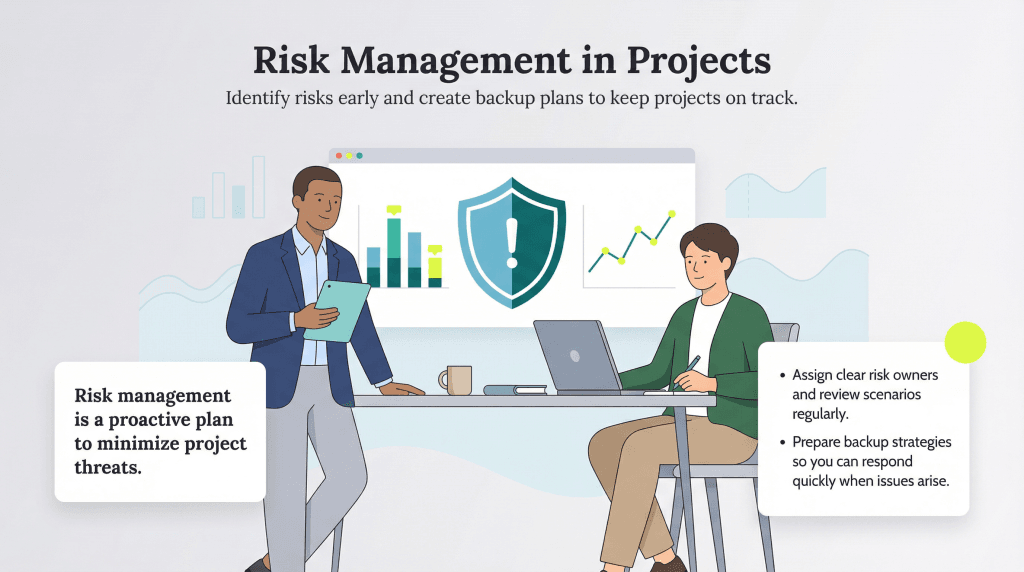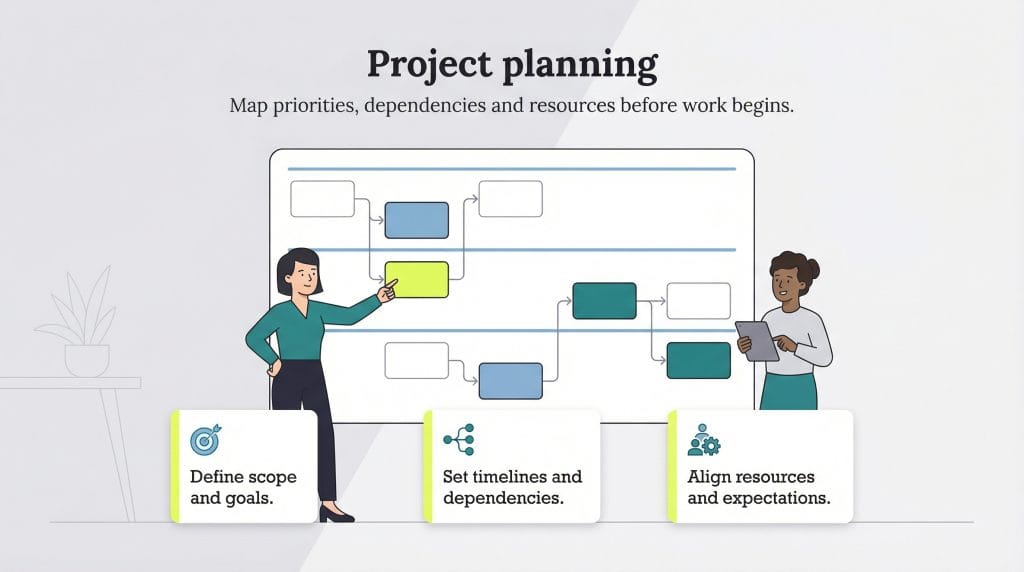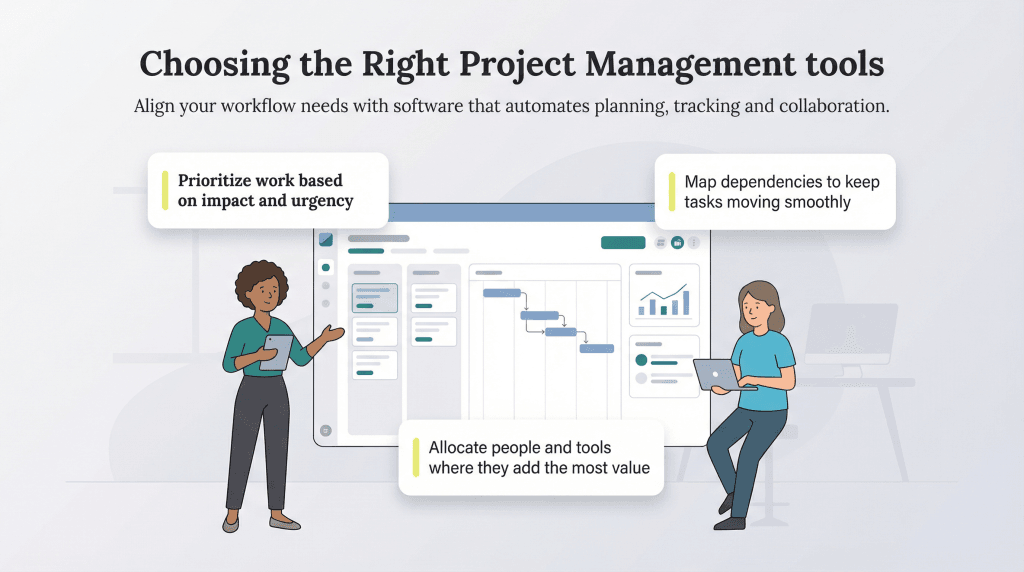Business.com aims to help business owners make informed decisions to support and grow their companies. We research and recommend products and services suitable for various business types, investing thousands of hours each year in this process.
As a business, we need to generate revenue to sustain our content. We have financial relationships with some companies we cover, earning commissions when readers purchase from our partners or share information about their needs. These relationships do not dictate our advice and recommendations. Our editorial team independently evaluates and recommends products and services based on their research and expertise. Learn more about our process and partners here.
What Are Project Management Skills and Why Are They Important?
Master the project management skills that drive business success and team efficiency.

Table of Contents
Whether you’re a business owner, a team leader or you’re building a career in project management, understanding how to plan and execute projects efficiently can dramatically improve outcomes. With the right combination of strategy, skills and software, any business can elevate its project management game.
We’ll explore various types of project management skills, from technical expertise to interpersonal capabilities, to help ensure that you have a comprehensive toolkit to lead projects with confidence, precision and purpose.
What are project management skills, and why are they important?
Project management skills are the abilities and competencies needed to plan, execute and complete projects effectively. “It’s a critical set of skills for increasing the likelihood that you’re going to get to predictable and positive outcomes,” said Harry Max, managing director of Peak Priorities LLC and author of Managing Priorities: How to Create Better Plans and Make Smarter Decisions.
These business skills typically fall into two primary categories:
- Hard skills involve concrete, teachable abilities such as scheduling, budget planning and using project management software. They’re often referred to as technical skills because they’re specific to the tools and methods used in project delivery.
- Soft skills, such as communication and leadership skills, relate to emotional intelligence and how you interact with others. Also known as professional or power skills, soft skills influence collaboration and personal effectiveness.
Technical knowledge is always helpful, but it isn’t necessarily required to lead projects successfully. Clint Padgett, CEO of Project Success Inc., explained that effective project managers often don’t need deep subject-matter expertise.
“People always ask me, ‘Well, do you have to have technical knowledge about a specific topic to be the project manager?’ And the answer is no, not really,” Padgett said. “To me, the best project managers don’t necessarily know how to do the work, but they can understand how it all fits together.”
Padgett emphasized that seeing the big picture and understanding how each element of a project connects is what sets great project managers apart, even if they aren’t the ones doing the technical work themselves.
Technical knowledge and big-picture thinking are crucial, but success often hinges on a broader mix of capabilities. According to the Project Management Institute, organizations that prioritize hard skills report a 65 percent success rate, while those emphasizing soft skills achieve a 72 percent success rate — a clear case for balancing both.
Why project management skills matter
Strong project management skills help individuals and teams stay organized, prioritize tasks effectively, manage time wisely and respond to challenges strategically. For businesses, that means fewer missed deadlines, better resource allocation and improved team collaboration.
“Project management skills are at the heart of how things get done,” Max said. “In order to get things done well, one has to be able to effectively prioritize, plan and translate priorities into plans that require sequencing, managing dependencies and managing risks.”
1. Time Management
Time management is an essential project management skill because time is a limited and valuable resource in any project. Without it, deadlines slip, productivity suffers and projects risk going off track. Mastering this skill helps keep teams focused, organized and efficient.
“If deadlines matter, then project management skills will help you make sure you’re meeting the deadline,” Padgett said. “Or, in some cases, we know we’re not going to meet the deadline, and we’ll know how far off we are, and then we can make decisions.”
- What it is: Time management is the ability to strategically plan and control how time is allocated across tasks and team members.
- How to use it: Set realistic deadlines, use calendars or digital scheduling tools, and regularly review progress to avoid delays. Encourage open communication, prioritize high-impact tasks and keep the team aligned with goals and timelines.
- Type of skill: Soft skill
2. Communication
Successful projects rely on clear and consistent communication between all stakeholders. Whether you’re coordinating with a team, reporting to executives or updating clients, effective communication prevents confusion and keeps everyone aligned.
- What it is: Communication is the ability to share information in a way that’s clear, actionable and appropriate for all stakeholders. It can include verbal updates, video calls via platforms such as Zoom, or written messages through tools such as email or internal communication apps such as Slack.
- How to use it: Hold regular check-ins, use collaboration platforms and adapt your messaging style based on your audience.
- Type of skill: Soft skill
3. Leadership
Leadership is about more than just managing people; it’s about inspiring, guiding and motivating a team toward shared goals.
- What it is: Leadership is the ability to guide, influence and motivate others to achieve collective goals. Good leaders foster trust, accountability and a positive work environment, helping to lay the foundation for effective conflict resolution.
- How to use it: Set a clear vision, keep the team organized and address conflicts quickly. Recognize achievements and build a supportive culture that keeps people motivated and accountable.
- Type of skill: Soft skill
4. Risk management

Every project carries some level of risk. What matters is how those risks are handled. A proactive approach can save time, money and your brand reputation.
- What it is: Risk management is a structured process for identifying, analyzing and minimizing potential project risks before they impact deliverables. Project managers must anticipate problems early and create mitigation plans in advance.
- How to use it: Start by building a risk-assessment plan and assigning ownership for key risks. Be sure to have backup strategies in place so you can change course quickly and keep the project on track if something goes wrong.
- Type of skill: Soft skill
5. Budgeting
Even a well-planned, well-managed project can fall apart if costs aren’t kept in check. Staying mindful of the budget and making adjustments as needed can mean the difference between success and failure.
- What it is: Budgeting involves determining the cost of a project, allocating the necessary funds and monitoring spending to ensure that it stays within budget. When done well, it helps teams make the most of their resources and can lead to a better return on investment.
- How to use it: Monitor expenditures regularly; use budgeting, forecasting and financial tracking tools; and stay flexible to adjust spending based on scope changes or evolving project needs. When evaluating expenses, confirm whether they’re needed and determine how much reasonably can be allocated.
- Type of skill: Hard skill
6. Problem-solving
Projects don’t always go according to plan. Strong problem-solving skills help teams stay on track and prevent issues from derailing progress.
- What it is: Problem-solving is the ability to identify challenges, analyze them and determine the best solutions — often under pressure. When issues arise, project managers must quickly assess the situation, pinpoint the root cause and take effective action.
- How to use it: Get the team together for brainstorming, use root cause analysis to understand the problem and put solutions in place quickly to keep things on track.
- Type of skill: Soft skill
7. Scheduling
A clear schedule acts as a roadmap for project execution. It ensures everyone knows what must be done, helping teams stay on track and meet deadlines.
- What it is: Scheduling means laying out tasks on a timeline, assigning resources and identifying key deadlines and milestones.
- How to use it: Use project management tools such as Gantt charts and calendars to visualize timelines and manage task dependencies.
- Type of skill: Hard and soft skill
8. Collaboration
When team members work well together, productivity increases and creativity flourishes. Effective collaboration also strengthens problem-solving and decision-making across departments.
- What it is: Collaboration is the ability to work cooperatively with others toward shared objectives.
- How to use it: Build a team-oriented culture, encourage open communication and facilitate idea-sharing sessions to boost innovation and group problem-solving.
- Type of skill: Soft skill
9. Adaptability
Projects can shift at a moment’s notice due to internal changes or external factors. Adaptability allows project managers to respond flexibly to new information, unexpected obstacles or shifts in business priorities. It’s a key trait for navigating uncertainty.
- What it is: Adaptability is the ability to adjust tactics and approaches in response to evolving project requirements or external challenges.
- How to use it: Stay open to feedback, regularly reassess project plans and remain flexible to lead your team through change and uncertainty.
- Type of skill: Soft skill
10. Negotiation
Whether you’re working out a project’s scope with a client or renegotiating deadlines with your team, excellent negotiation skills are key to keeping everyone on the same page and the project running smoothly.
Max pointed out that good negotiation skills aren’t just about compromising, they’re also essential for setting boundaries and managing competing priorities. Without them, projects can quickly become overwhelmed by conflicting demands.
“The single most important thing that people would benefit from learning and applying more effectively is basic negotiation skills, because one of the great challenges with managing projects is too many [priorities],” Max said. “That happens when effective prioritization doesn’t happen, and that happens when people don’t say no, or not yet, or maybe later.”
- What it is: Negotiation is the ability to reach agreements that meet the needs of multiple stakeholders. You may need to persuade others to accept terms or work together to adjust them in everyone’s best interest.
- How to use it: Apply active listening, emotional intelligence and persuasive communication to manage workplace conflicts and set realistic expectations. Do your research beforehand so you’re prepared to propose solutions that benefit all parties involved.
- Type of skill: Soft skill
11. Technical proficiency
Modern project managers often rely on specialized tools and platforms to organize, track and execute projects. Being technically proficient ensures that you can fully leverage those systems to drive better outcomes. It also helps bridge communication gaps with IT or development teams.
- What it is: Technical proficiency is the ability to operate and understand project-specific tools, systems or platforms.
- How to use it: Learn platforms such as monday.com, Trello or Jira to manage tasks, automate workflows and analyze project data. If your company uses a specific tool, take time to understand its features so you can use it effectively.
- Type of skill: Hard skill
12. Resource management
Managing people, tools and materials effectively ensures that a project can be completed efficiently and on budget. Poor resource management often leads to employee burnout, delays or missed deadlines.
- What it is: Resource management is the process of assigning and optimizing the use of people, materials and budget. It requires the ability to allocate resources strategically and communicate clearly with the entire team.
- How to use it: Monitor resource availability, avoid overloading individuals and align resource distribution with project phases and priorities.
- Type of skill: Hard skill
13. Emotional intelligence (EQ)
Emotional intelligence helps project managers navigate interpersonal dynamics with empathy and clarity. It allows you to lead with understanding, manage stress effectively and support team morale.
- What it is: Emotional intelligence is the ability to recognize, understand and manage your own emotions and respond appropriately to the emotions of others.
- How to use it: Practice self-awareness, stay calm under pressure and empathize with your team to strengthen communication and morale.
- Type of skill: Soft skill
14. Task delegation
No project manager can handle everything alone. That’s why knowing how to delegate is so important. Handing off responsibilities helps manage workload, builds trust and gives team members a chance to step up.
- What it is: Task delegation is the strategic assignment of responsibilities based on individual strengths, roles and availability.
- How to use it: Identify each team member’s strengths, assign tasks with clear expectations and follow up to ensure accountability and provide support.
- Type of skill: Soft skill
15. Decision-making
Project managers face constant choices about timelines, team roles, risks and scope. Being able to make sound, timely decisions helps maintain momentum and prevent costly delays.
- What it is: Business decision-making is the process of evaluating options and selecting the most effective solution or course of action.
- How to use it: Consider data, stakeholder input, potential risks and long-term impact to make informed choices. Prioritize what’s best for the project as a whole.
- Type of skill: Soft skill
16. Attention to detail
Small mistakes can escalate quickly into major problems in complex projects. Attention to detail helps ensure quality, consistency and accuracy across all phases of the project.
- What it is: Attention to detail is the ability to spot errors, inconsistencies or missing components in tasks or plans and take steps to correct them.
- How to use it: Regularly review work, create checklists and encourage team members to perform quality checks before final delivery.
- Type of skill: Soft skill
17. Project planning

A strong project plan is the foundation of successful execution. Planning brings structure to the process and ensures the team is aligned from day one. Max emphasized that one of the most critical parts of planning is knowing how to prioritize, manage dependencies and allocate resources effectively.
“The challenge in project management is really knowing what to focus on,” he said. “It’s knowing what the order of those things [is], and it’s knowing how to apply resources to that in a way that’s likely to get you where you want to go.”
- What it is: Project planning is the process of defining scope, goals, timelines, resources and deliverables before execution begins. It provides a roadmap for how and where to start.
- How to use it: Use planning documents, stakeholder meetings and project charters to align the team and clarify expectations from the start.
- Type of skill: Hard skill
18. Data analysis
Data offers the insights needed to improve project performance, measure return on investment and identify trends. Without this skill, decisions rely on guesswork rather than evidence.
- What it is: Data analysis is the ability to interpret information, spot patterns and use metrics to evaluate project performance.
- How to use it: Track key performance indicators, review reports from project tools and apply findings to refine workflows and increase efficiency.
- Type of skill: Hard skill
Project management tools

Leveraging the right project management methodologies and tools is essential for effectively applying project management skills. These systems streamline communication, organization and execution for project teams of any size.
Max advises carefully assessing your organization’s workflow before choosing tools, and making sure you understand the following first:
- How to prioritize effectively
- How to manage dependencies
- How to sequence tasks
- How to allocate resources
“If you understand those, then it becomes a question of which actual software tooling you use, whether that’s for prioritization or whether that’s for project planning itself,” Max said.
Padgett added that although programs such as Microsoft Excel are commonly used for project management, manually moving everything around is far less efficient than using dedicated project management software that automates those processes.
With that in mind, here are some highly effective project management platforms:
- monday.com: A flexible platform that enables teams to manage everything from simple task lists to complex project workflows. Its user-friendly, mobile-compatible interface includes automation, collaboration, reporting and scalable features. Read our monday.com email marketing review to learn more.
- Trello: A free, visual board-based system ideal for managing smaller projects and workflows. Its intuitive design helps every team member understand and manage tasks more efficiently. “Trello is a very simple Kanban tool provided by Atlassian,” Max said. “I’m a big fan of that because it allows people to pick work and manage the amount of work they have in progress, and it helps keep priorities in focus.”
- Asana: A robust tool that offers timeline views, task dependencies and customizable project templates. The web-based and mobile-friendly platform includes risk forecasting, project tracking and unlimited storage.
- ClickUp: A versatile, free platform that combines documents, spreadsheets, goal tracking and project boards. It offers 14 task views, including list, mind map, calendar and Kanban, and uses widgets to highlight important tasks.
- Zoho Projects: A cloud-based solution suited for businesses of any size. Its mobile apps and asynchronous collaboration tools support remote teams. Features include Gantt charts, resource allocation, workflow automation, issue tracking and reporting. (To learn about how the Zoho ecosystem works for your overall business needs, read our Zoho CRM review.)
- Wrike: Designed for high-performance teams, Wrike provides advanced collaboration and reporting tools to improve transparency. Custom workflows and built-in risk prediction help ensure that projects stay on track.
